
- Share via
- Korean Americans are returning to the country of their birth in record numbers, hoping to retire amid the comforts of home.
- They are joined by “reverse migrants” of a different mold: American-born Koreans, disillusioned with the U.S., are seeking a better life in the country their parents left long ago.
- But for many, the thrill of starting over is proving to be complicated with questions of identity: Will they ever be accepted as “really Korean”?
SEOUL — John Tae-yu Kim arrived in the United States in 1990 as a 30-year-old seminary student from South Korea — only to quit his studies in a spell of doubt.
He eventually married, started a family and became an American citizen. Drifting from Baltimore to Anaheim, he worked at a fish shop, a deli, an ice factory and a painting company before settling in Seattle, where he opened a teriyaki restaurant. Then, before he knew it, he was 60.
Three years ago, he and his wife moved to South Korea, where he vowed to never again do manual labor.
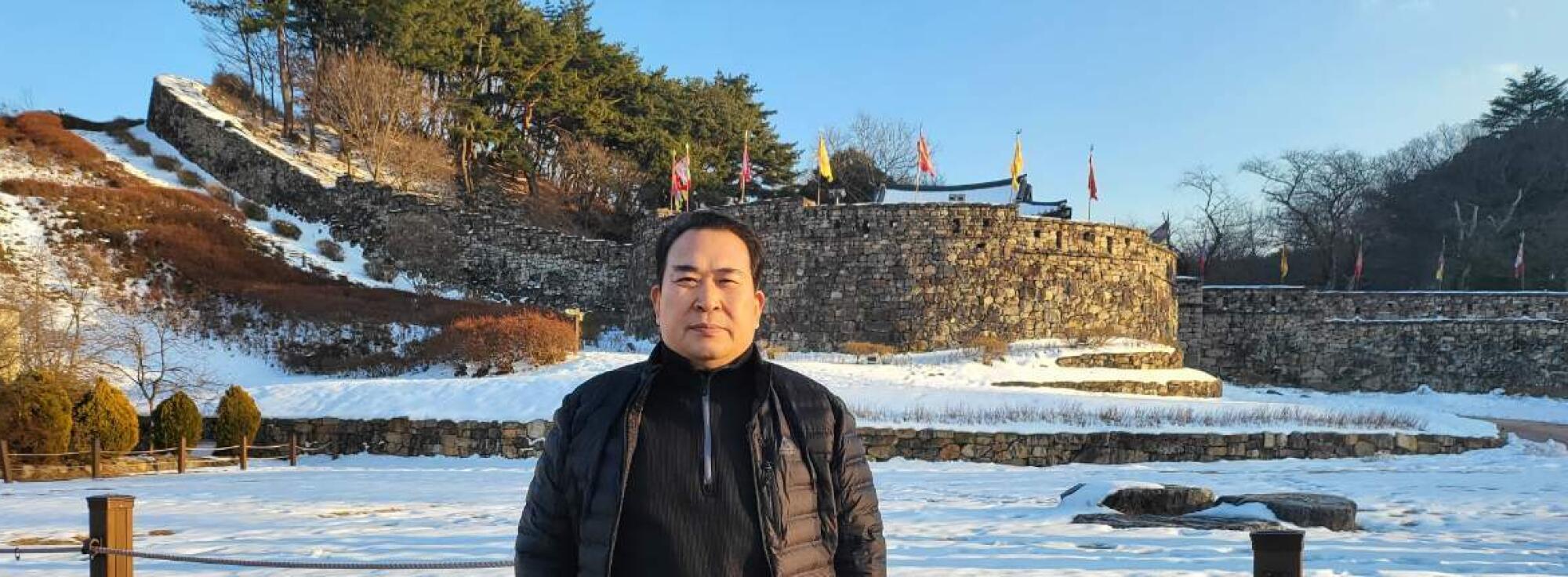
“I always wanted to return,” said Kim, 63. “There’s a certain stress and sorrow that comes from living away from home for so long.” With his adult sons settled into stable careers in the U.S., Kim and his wife moved into a retirement community in Gochang, a rural town at the southwestern tip of the country. About a third of the community’s 800 or so residents are also first-generation Korean American immigrants who have come here for similar reasons.
The amenities on offer include a hot spring, golf, table tennis and plenty of walking paths. Kim has time to practice calligraphy and write poetry.
The enclave points to a growing immigration trend: In the decades since South Koreans immigrated en masse to the United States in search of better livelihoods, many are now coming back to retire amid the comforts of home. Last year, 9,379 Korean Americans got their Social Security payments in South Korea, compared with 3,709 in 2013.
They are joined by reverse migrants of a younger, different mold: American-born Koreans who, disillusioned with life in the U.S., are now seeking new ones in the country their parents left behind. Some are led here by vivid memories of childhood visits or the urban conveniences of Seoul, others by a desire to shed their status as a racial minority.
But in South Korea, those joys are complicated by new questions of belonging.
At times, Kim wonders whether he was happier in the U.S. He misses the casual friendliness of Americans, the spaciousness, the more relaxed pace of life.
“It was just so different when I returned after so many years,” he said.
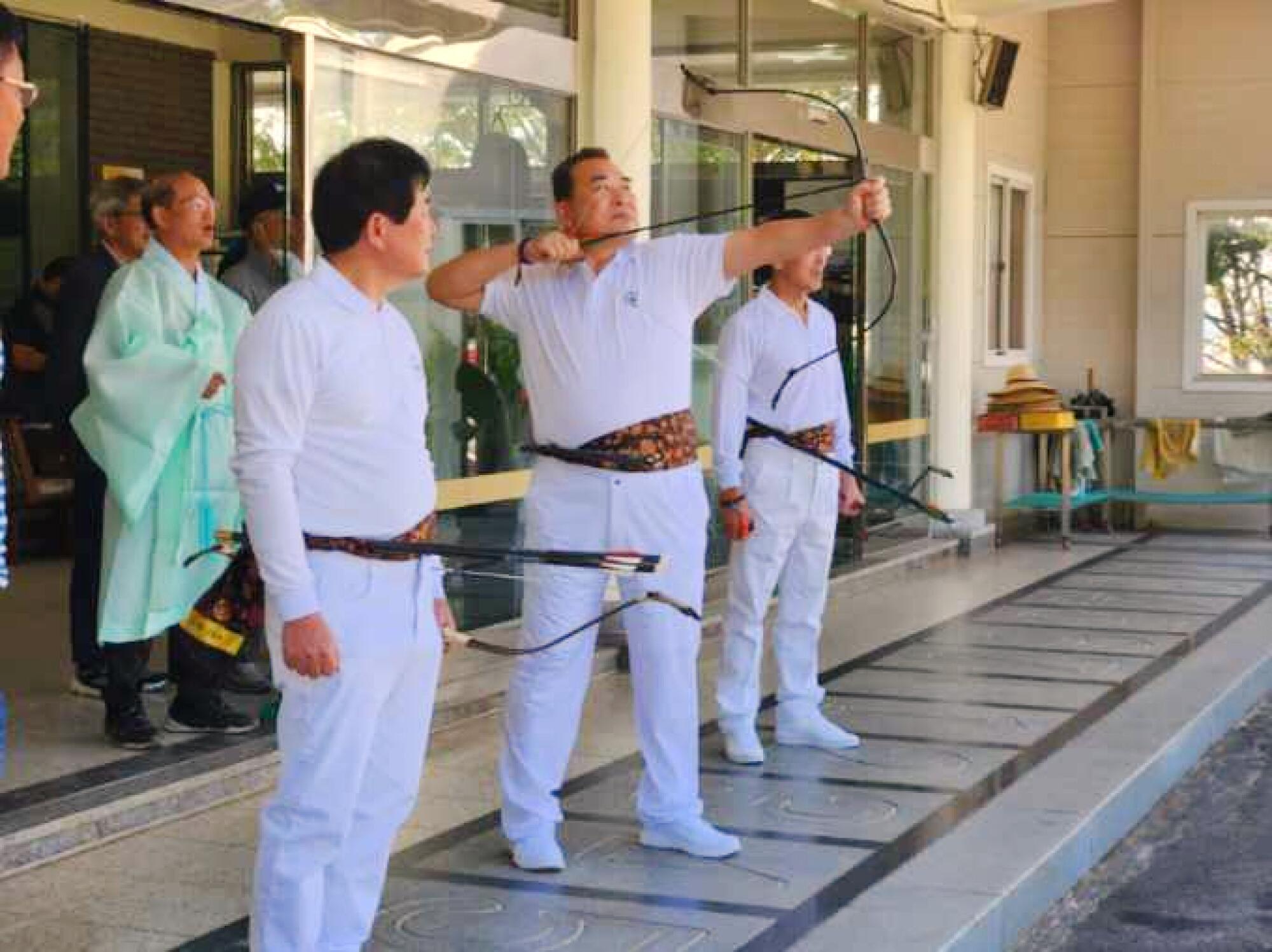
By some measures, Koreans are one of the most scattered ethnic groups in the world, with over 7 million living across more than 180 countries.
More than a third of them — around 2 million — live in the U.S., where large waves of Koreans settled in cities like L.A. and New York after race-based immigration restrictions were lifted in 1965.
But in recent years, amid mounting alarm over its plummeting fertility rates, South Korea has been redoubling its decades-long efforts — such as ethnic identity-building campaigns and employment programs — to bring them back.
“Encouraging our compatriots to return and creating a stable environment where they can settle down can be a solution to South Korea’s population decline and labor shortage,” Lee Sang-deok, chief of the newly created Overseas Korean Agency, said in an interview this month.
In contrast to ethnic Koreans from China and former Soviet republics, who are increasingly being called upon to provide cheap labor for declining industries like manufacturing, Korean Americans are being recruited by companies and universities as skilled workers and students with a Western cachet.
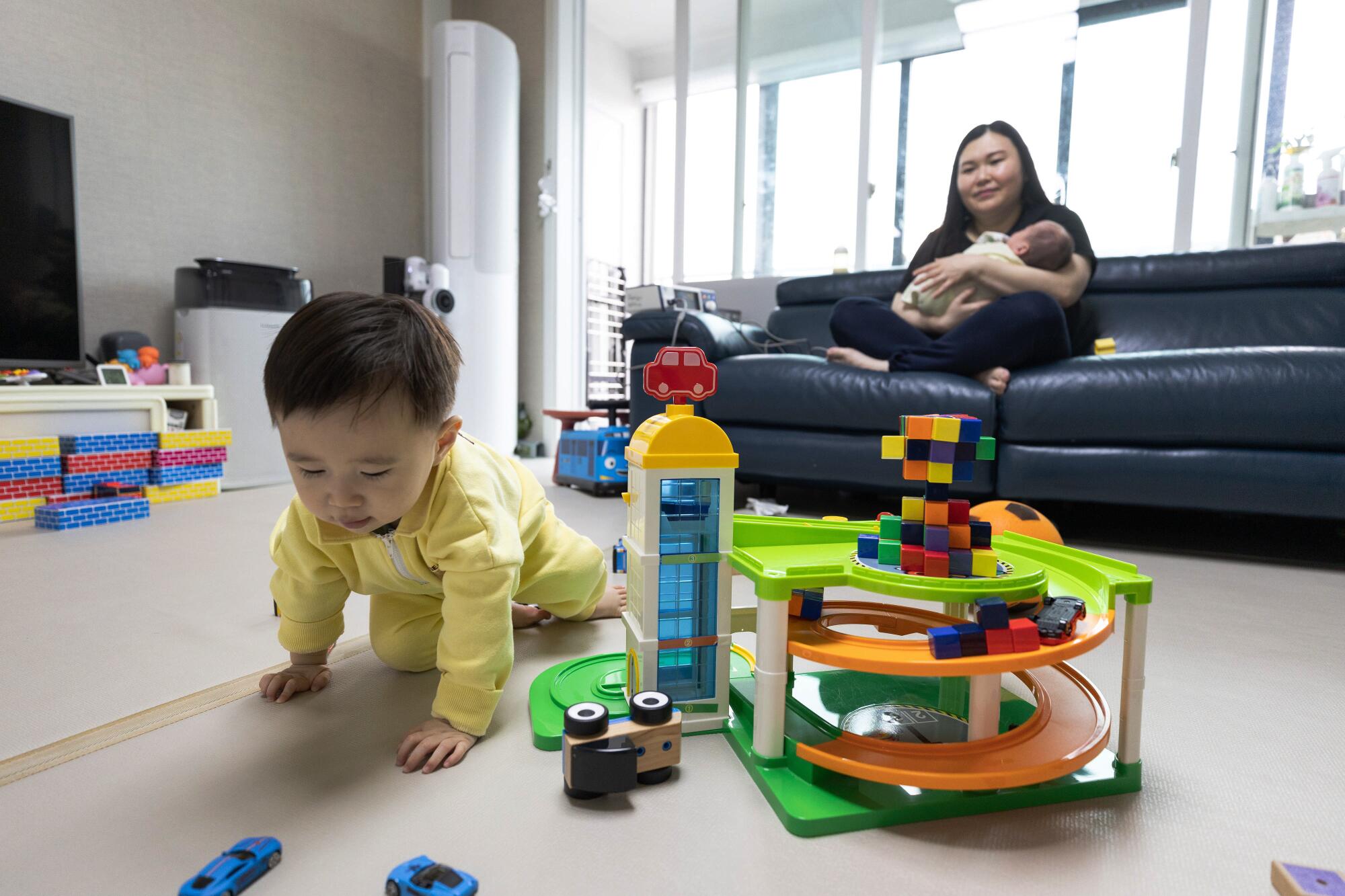
There are currently 47,406 Korean Americans residing in South Korea, up from 35,501 in 2010, according to data from the Ministry of Justice.
They are driving the record high number of diaspora Koreans reclaiming their South Korean citizenship, making up more than 60% of the 4,203 such cases last year.
Among those seeking to capitalize on this trend is the city of Wonju, whose mayor traveled to San Francisco in May to urge the diaspora population to move to his city. Officials say they are planning to launch a program that will allow older Korean Americans to do a monthlong trial stay in the city later this year.
“The idea is that when elderly Korean Americans come to Korea, they’ll buy real estate and spend money in the country,” said Lee Jean-young, a scholar of the Korean diaspora at Inha University in Incheon.
He believes this is just the beginning.
Since the peak immigration years of the 1970s, when the majority of Koreans were still heating their homes with coal briquettes, the country has become the 14th-largest economy in the world and a global cultural force.
“Many younger Korean Americans are also starting to identify with their Korean heritage more,” he said. “To them, South Korea has become a place of opportunity.”
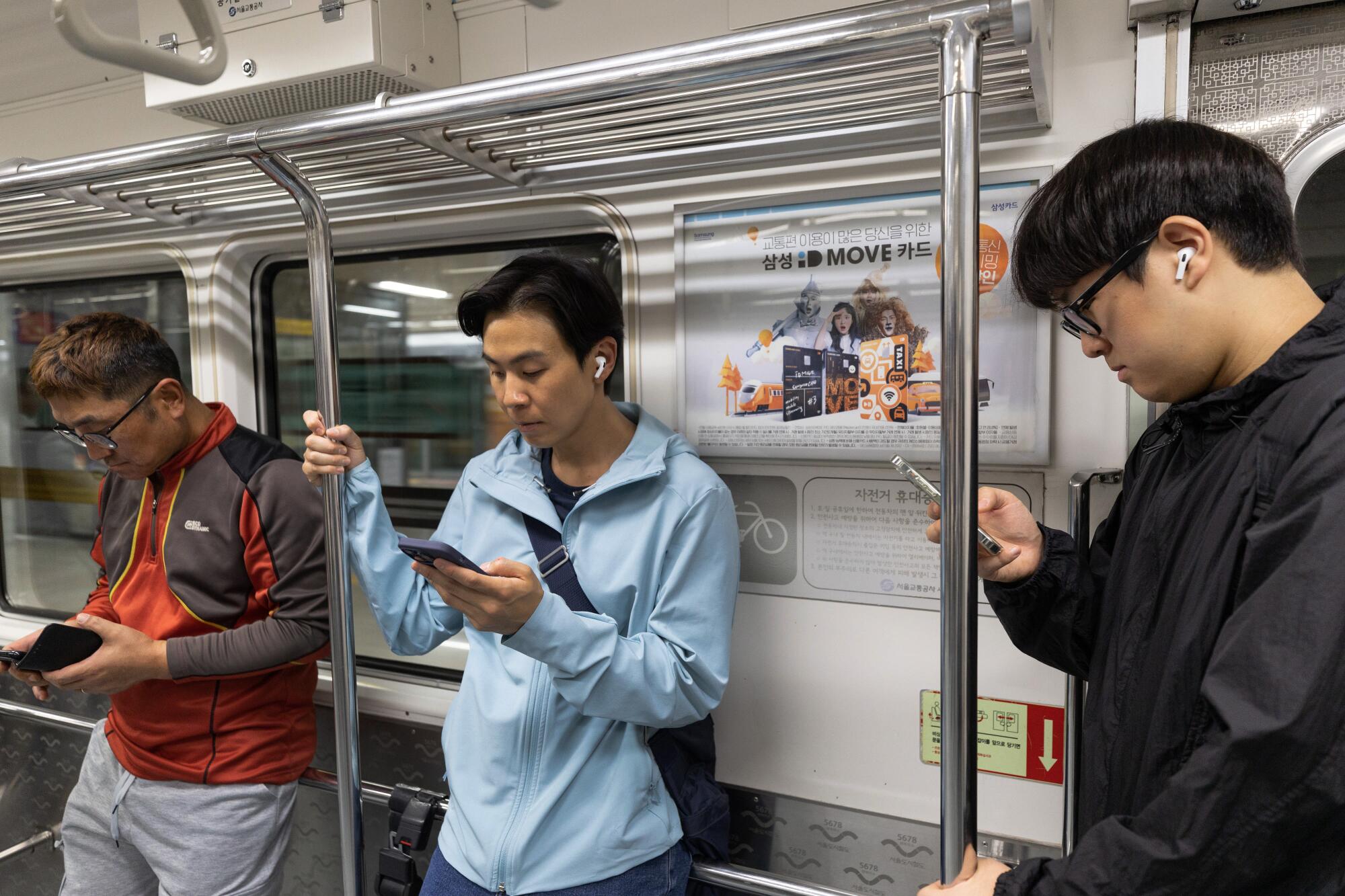
: :
Cha Deok-hee, an 80-year-old retired nurse from Temecula who left South Korea in 1960, says it was more than just nostalgic longing that brought her back: It was boredom.
“There was nothing to do but play golf,” she said. “Then all our golfing friends left, one by one.”
Three years ago, she and her husband settled in Daejeon, a city of 1.5 million south of Seoul.
The city is lively and safe. Public transportation is accessible and free for senior citizens, eliminating the need to drive. She has made friends from church. Korean food is plentiful. Best of all, she and her husband are covered under South Korea’s single-payer national health insurance plan, and hospitals are close and affordable.
“The process of seeing a doctor in the U.S. was so frustrating sometimes that we used to say you might as well save yourself the time and die,” she said.
“It was one of the few situations where I felt the language barrier. It was always so stressful trying to express exactly what I wanted to say.”
Others — particularly those from a younger generation who grew up hyper-aware of their racial identity — describe a similar feeling of ease that comes from no longer being a visible minority.
“At first I didn’t know what this feeling was but I was like, ‘Oh, I don’t feel like people are staring at me in a certain way,’’’ said 38-year-old Crystal Kim, who grew up in Mobile, Ala., but moved to Seoul in 2016.
With a special visa that allows diaspora Koreans to freely work and live in the country, Kim is working part-time as an English teacher while getting her freelance photography career up and running.
She pays around $650 in rent for a spacious studio loft in a city that is both walkable yet big enough to have international art exhibitions, and where convenience stores are open all night.
“People ask me all the time, ‘Don’t you want to move back home?’ And I’m like, ‘No I think I’m good,’” she said.
“Especially with current politics and stuff, the more that I live here and then every time I go back to the States, it doesn’t feel like home anymore.”
: :
Yet the reception from South Korean society isn’t always one of warmhearted kinship.
“I guess it’s almost like I have the same problem from the States, just in a different context,” Kim said.
As in the 1970s, when South Korean society regarded immigrants to the U.S. with a mixture of envy, admiration and disdain, local perceptions of Korean Americans today are no less conflicted.
Compared with Chinese Koreans — known as joseonjok — who are frequently portrayed in the media as gangsters or grifters, Korean Americans — or gyopos — are represented by celebrities like singers Jay Park or Jessi, both of whom launched their careers in South Korea. Seen as worldly and well-credentialed, they are helped by what many describe as an invisible boost in career or academic advancement.
Leo Rhee, a 54-year-old pastor from Chicago who is working on a doctoral dissertation about the reverse Korean American diaspora at Torch Trinity Graduate University in Seoul, recalled a Korean American friend who had gotten into legal trouble in the U.S. for dealing drugs before coming to Korea, where he was accepted by one of the SKY schools — South Korea’s equivalent of the Ivy League — and graduated with a business degree.
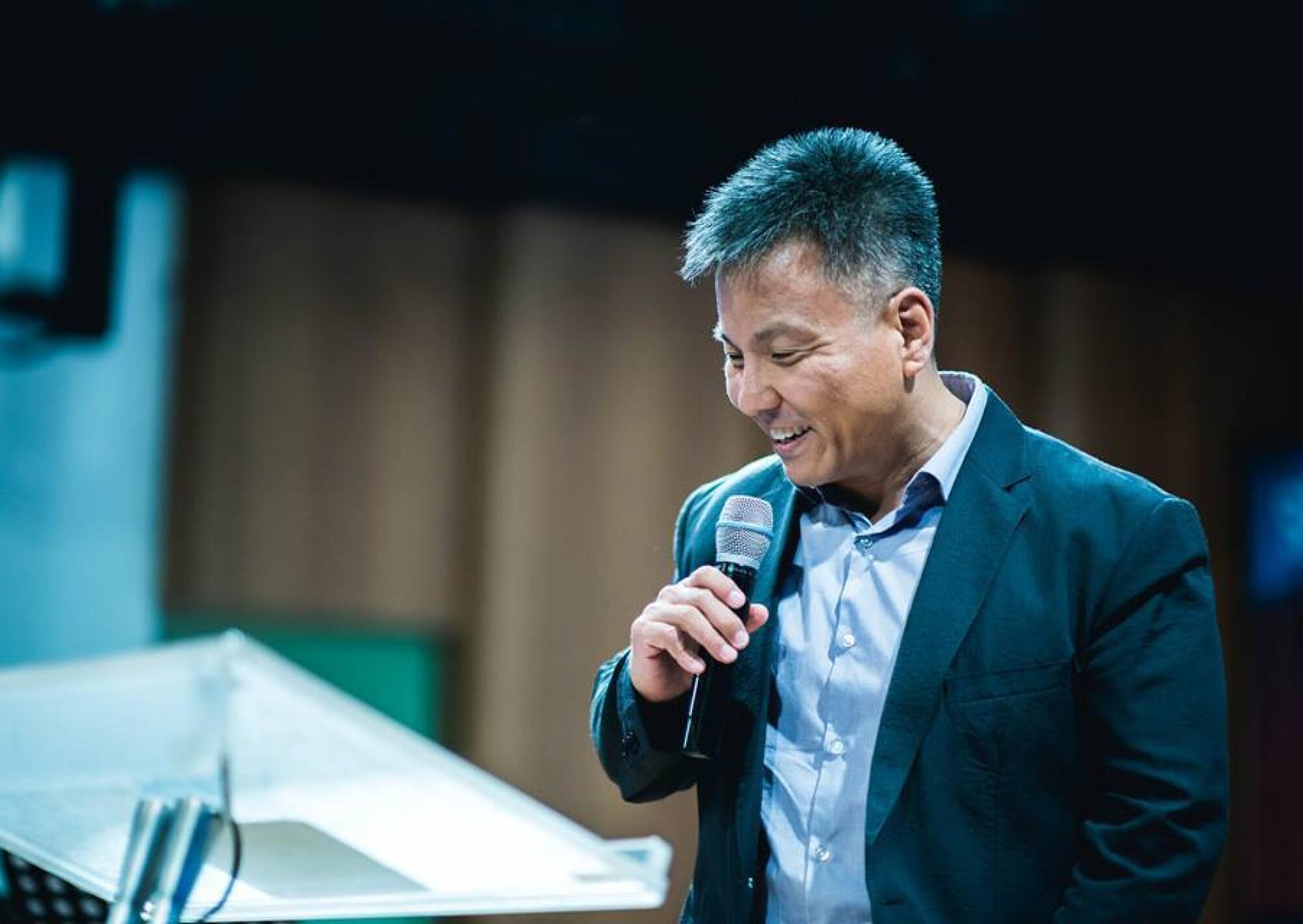
“Koreans here have been busting their butt since the day they’re born just to take the college entrance examinations to get into one of these SKY schools,” he said.
“But then guys like us could get into schools like Seoul National University or Yonsei University relatively easily, even if you mess up in America.”
Rhee noted that such privileges have fed into less favorable views of Korean Americans as spoiled opportunists — fair-weather Koreans who had left the country when things were tough only to return now that the going is good.
At his retirement community in Gochang, John Tae-yu Kim has been feeling this same gaze from the native Korean residents.
“These prejudices randomly surface during conversations, like this idea that we came back just to take advantage of the medical care, despite not having paid taxes,” he said.
: :
For Brian Kim, a 41-year-old L.A. native who moved to South Korea 12 years ago, it sometimes feels like no amount of assimilation is ever enough.
Kim, who is a postdoctoral candidate researching the reverse Korean diaspora at Seoul National University, completed two years of South Korean military service in 2020, a rite of passage for Korean men that granted him South Korean citizenship — and he hoped it would lend his scholarship more legitimacy.
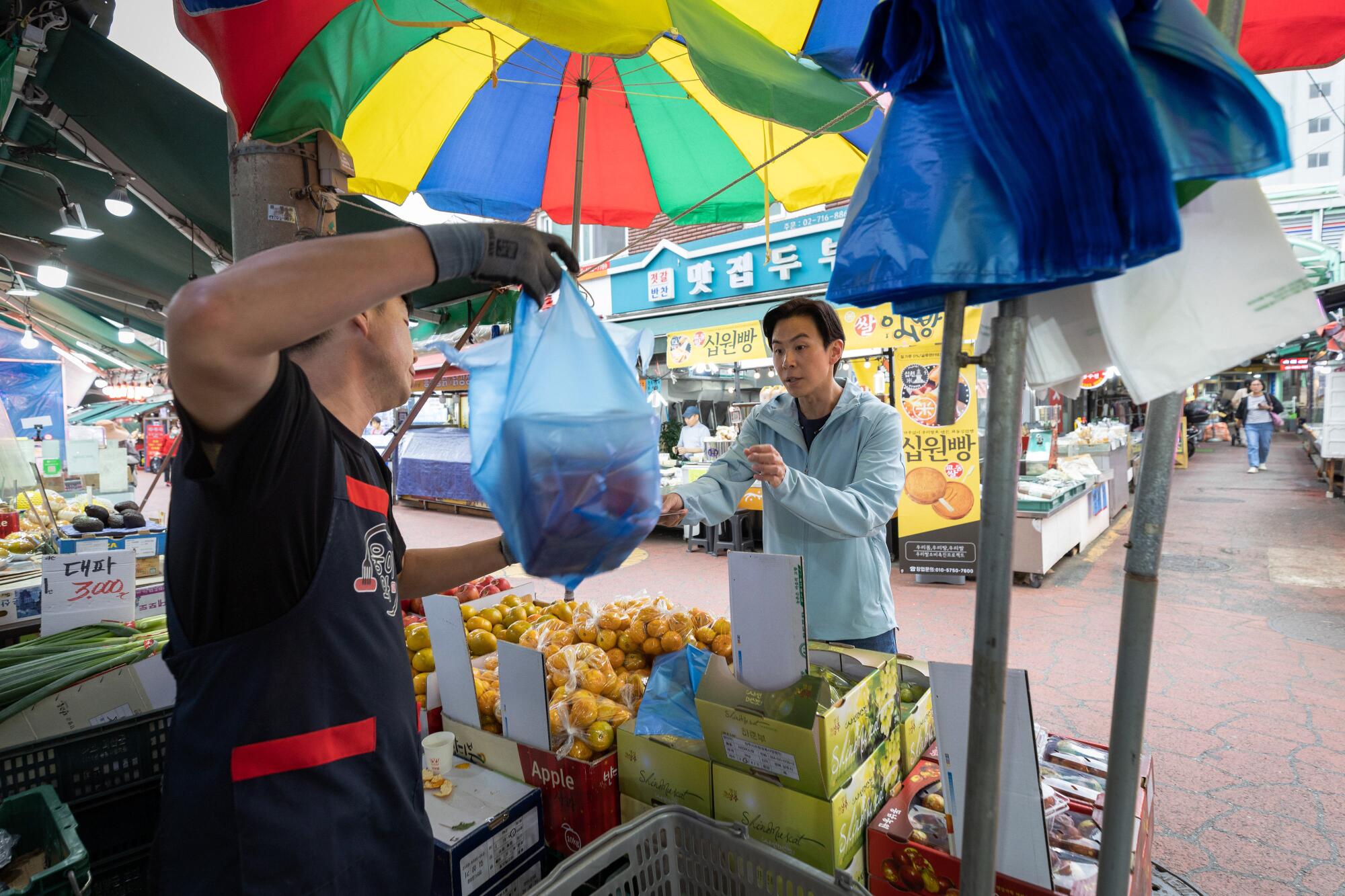
“When I was a foreigner, legally speaking, I was very skeptical or very uncomfortable with expressing my views of Korean society or politics outright because of this idea that I have no right to say it,” he said.
“But for some of my friends and peers, I feel they still think, ‘But yeah, you’re not really Korean.‘ It’s this sort of forever foreigner mentality.”
Meanwhile, those working in the English education market, an entry point for many expats wishing to establish themselves in South Korea, describe the opposite problem: being seen as “too Korean” in an industry where it is widely known that employers prefer Caucasians — because they can more easily be billed as “native speakers” to parents.
“Before I got this job, I think I applied to maybe 20 different places and I only heard back from maybe four — even with a master’s degree in education and a teaching license, just because I was a gyopo,” said Krystal Woo, a 39-year-old manager at an English kindergarten who moved from L.A. in 2015.
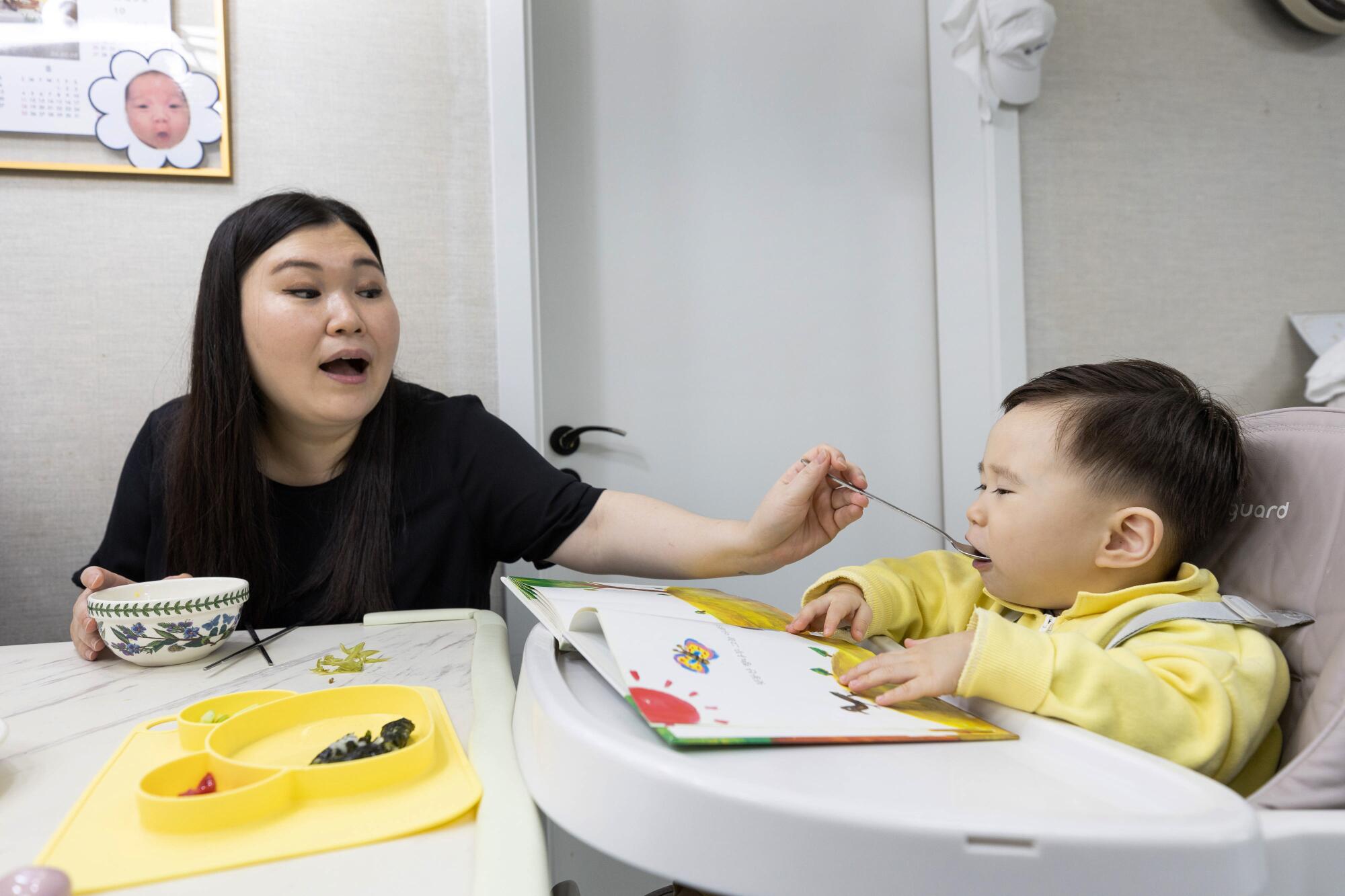
On the other hand, once they do get jobs, many gyopos say there is a perverse incentive to downplay their Koreanness. If they appear too assimilated, they may be more expected to understand certain Korean social codes that they find alien, such as workplace expectations, gender roles or seniority-based formalities.
“They just expect gyopos to have an understanding of the Korean mentality and if we don’t, then yeah, we definitely are penalized a lot more than we would be if we looked foreign,” she said.
“Even our administration team knows that I am a full-fledged foreigner, but they expect so much more of me compared to, say, my white counterparts. They’re just like, ‘Oh, you know, it’s fine because they’re white’ or ‘You’re a gyopo so you should know better’ — that kind of thing.”
: :
Woo, who just had her second son three months ago and is planning for a third child, might be considered a poster child for South Korea’s strategy of bringing in ethnic Koreans to help stave off demographic collapse.
But recently, she has begun to think about moving back to the U.S.
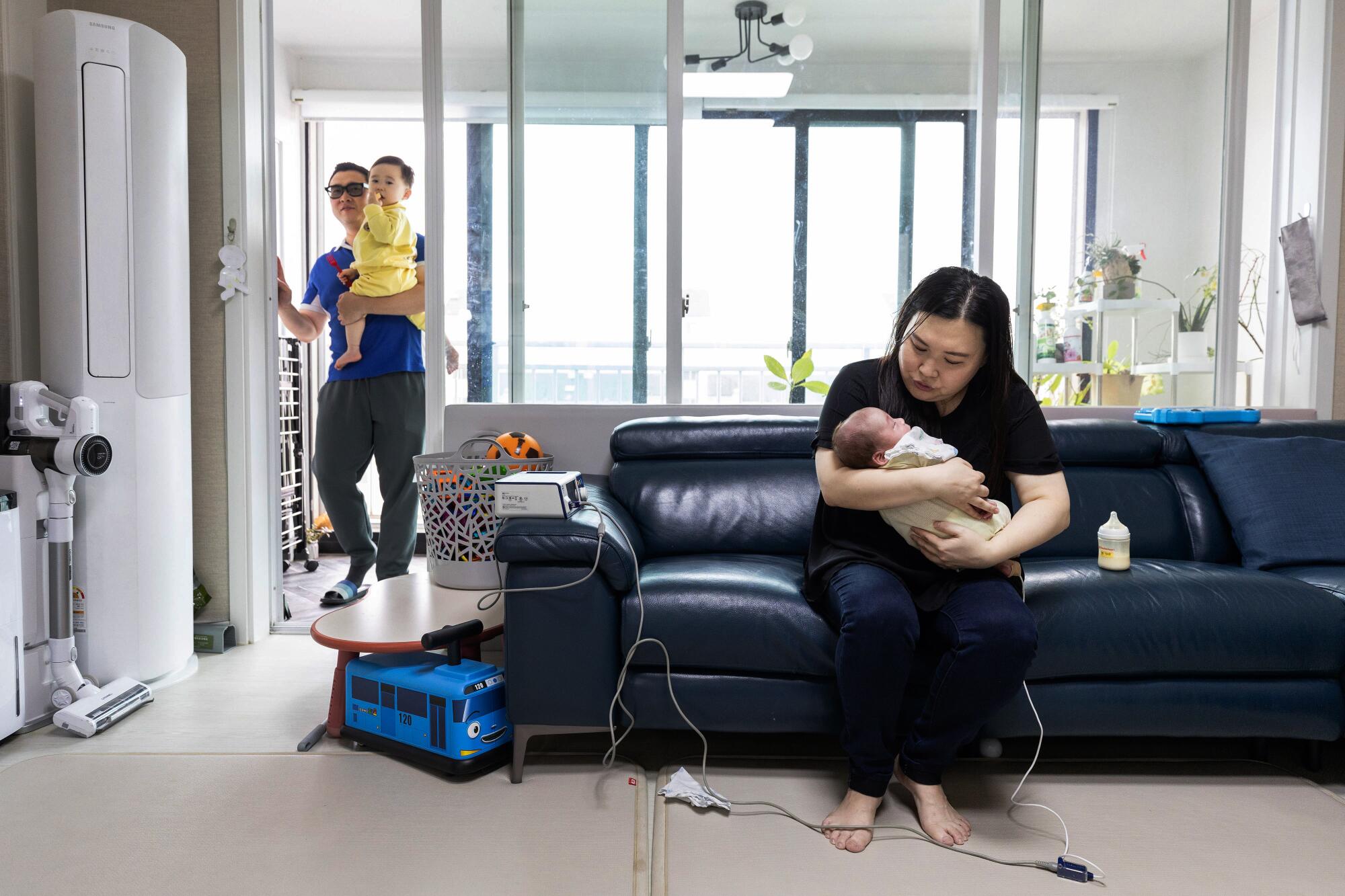
One major reason is South Korea’s intensely competitive education system. She criticized it for placing excessive testing pressures on children and financial burdens on parents; it is also one of the factors said to be driving down local birth rates.
“I definitely do not want my children growing up in the Korean education system,” she said. “There’s no long-term future there for us.”
Woo acknowledges the strange privilege of her situation: For anyone with the option to move away, living in a country gripped by alarm over fertility rates has been a boon.
Because her husband is a Korean citizen, she has been eligible for all of the benefits that the South Korean government has rolled out in a desperate attempt to encourage more births: heavily subsidized IVF treatments; free vaccinations; discounted pediatric care; monthly maternity leave stipends; about $3,000 in one-off pregnancy gifts; and around $750 in monthly support for the first year of each child’s life.
“It’s kind of to the point where I feel a little guilty for reaping so many benefits from Korea,” she said.
Like many of her female friends who are in a similar boat, Woo plans to stay until her oldest reaches schooling age, and then move back to the U.S.
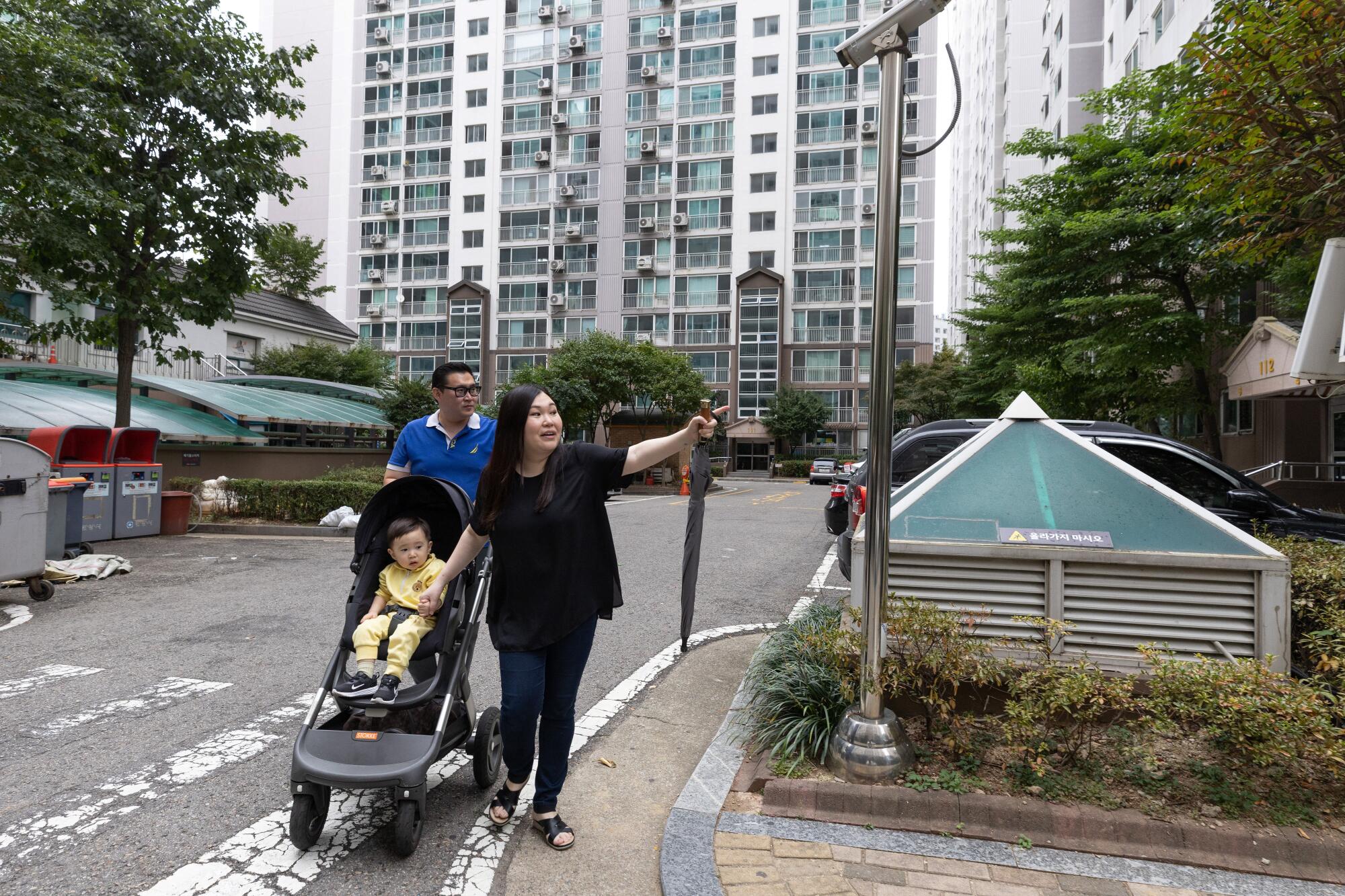
But the idea has been a hard sell for her husband, for whom immigration no longer holds the same allure it did for earlier generations.
“My husband is actually terrified. He’s so sure that if we were to move to the States that someone in our family will get shot,” Woo said.
“And as much as I try to convince him, ‘No, all you’re seeing is just the instances in the news,’ it’s happening so much more frequently now that, yeah, I kind of have doubts too.”
After nine years of watching from afar, all of the issues in California that had seemed simply part of the landscape — homelessness and the housing crisis, the job market, “the rise of the MAGA people” — have come to feel forbidding and foreign.
“I guess I really am torn on all this,” she said.
“I feel like the California that I’m going to return to, it already sounds and feels so different from the one I left.”
More to Read
Sign up for Essential California
The most important California stories and recommendations in your inbox every morning.
You may occasionally receive promotional content from the Los Angeles Times.











